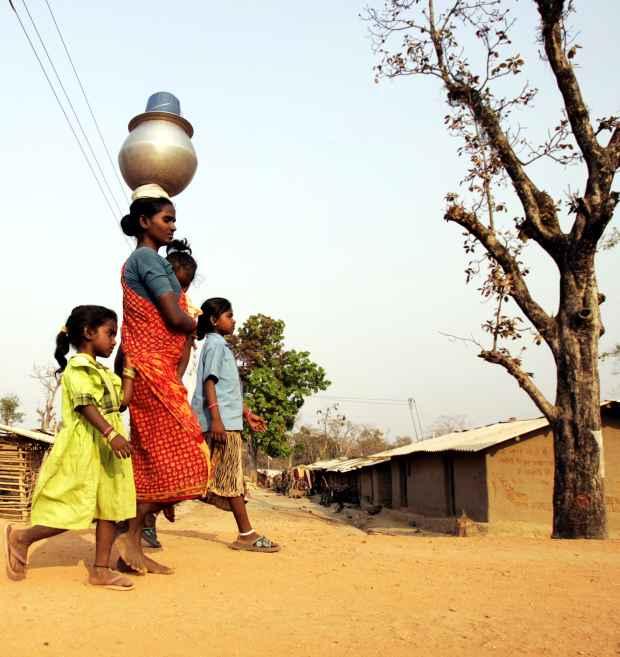
Candidates promise development, jobs and better administration but caste equations play a major role in the Red districts of the country that few parties can ignore.
In the Red districts of Bihar, it is a direct fight between the Rashtriya Janata Dal and the Bharatiya Janata Party combines. The parties have promised development, but they are betting on caste equations.
"All parties have fielded Manjhi candidates, the dominant caste in this constituency. The BJP wants to transform Gaya into a town of Gujarat, and the other parties are asking for votes to fight communal forces," says Mohammed Safi, a resident of Gaya.
The BJP has fielded sitting MP Hari Manjhi, but the RJD's Ram Manjhi appears to be gaining, as Lalu Prasad resurrects Muslim-Yadav ties. Jitan Ram Manjhi of the Janata Dal (United) may turn out to be the dark horse in the constituency.
Please …
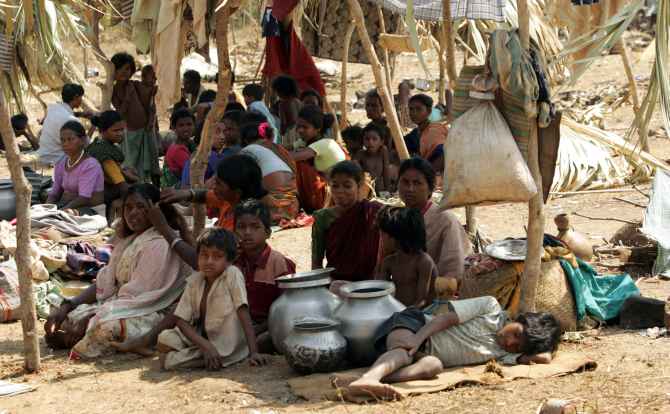
The prospects of the JD(U) are not that bright in Aurangabad, where it is a fight between two upper caste leaders, Nikhil Kumar of the Congress and Sushil Kumar Singh of the BJP, who joined the party a few days ago.
Nikhil Kumar, former police officer and governor of Kerala, is the son of a former chief minister of Bihar, Satyendra Singh. "They may talk about development, but it is clear they want votes on the basis of their caste," says Raju Singh, a local driver.
In Sasaram, Lok Sabha Speaker Meira Kumar has centred her campaign on development, but her poll managers do not fail to point out her husband belongs to a Scheduled Caste.
"A lot has been done for the poor during the last 10 years. We are underlining that. Having said that, Sasaram is also a backward region. People are more interested in caste than the development credentials of candidates. Therefore, we have to tell them," says a Congress supporter.
Sasaram has been a Congress stronghold since 1947. Kumar's father, Jagjivan Ram, held this seat for decades. Kumar is being challenged by Chedi Paswan of the BJP, who has promised to build roads.
K P Ramiah, the JD (U) candidate, is a former bureaucrat and considered close to Chief Minister Nitish Kumar.
Development is a big issue in Jamui. Lok Janshakti Party chief Ram Vilas Paswan has fielded son Chirag Paswan here. He has promised jobs to the constituency. Paswan's principal major opponent, Uday Narayan Chaudhary of the JD (U), is speaker of the Bihar assembly with a draw on tribal votes of this region.
Please …
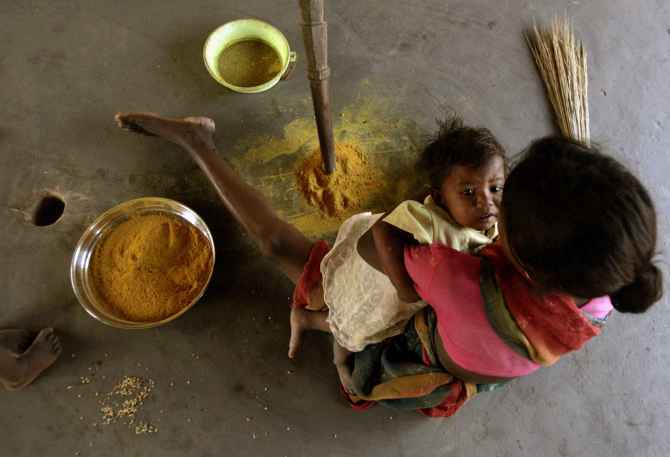
In Odisha, the ruling Biju Janata Dal and the Congress will vie for the Naxal-affected districts in the state's southern belt. The BJD, riding on Chief Minister Naveen Patnaik's charisma and people-oriented schemes, hopes to do well here.
"Better roads and education have the potential to change the face of regions under Naxalite threat. We plan to set up a medical college in Koraput,'' says senior BJD leader Rabi Narayan Nanda.
"Certain road projects are stuck because contractors are scared of the rebels. Our party is reaching out to people in remote pockets to get them to overcome this fear,'' says Jhina Hikaka, a BJD legislator from Laxmipur in Koraput.
Congress leaders, however, believe the BJD's propaganda will not yield electoral dividends.
"People still live in fear. Incidents of Naxal violence have been on the rise. The ruling party has failed to ensure security for the people in vulnerable areas,'' says a Congress leader hailing from Koraput. "Be it housing, roads or forest rights, only the Congress-led government at the Centre has ensured benefits flow to people in regions affected by insurgency,'' he adds.
A railway line and employment are key election issues in Chhattisgarh's Bastar district, says Congress leader Mithilesh Swarnkar.
The BJP's Vidyasharan Tiwari feels development projects undertaken by his party's government in the state are major issues.
Please …
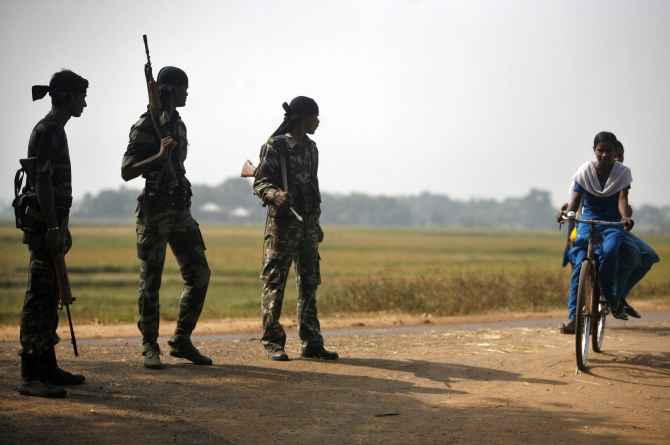
Politics in Bastar is a direct contest between the BJP and the Congress. Though the Communist Party of India has considerable sway in some pockets of south Bastar, it has not won a single seat of the 12 assembly constituencies in Bastar. No regional party has presence in the region.
"Traditionally, Bastar is a Congress seat," Swarnkar says.
Voters in the constituency prefer candidates over issues, says political analyst Subhash Rao. In remote pockets, where Naxals have established "liberated" zones, people are ignorant about Narendra Modi and Rahul Gandhi. But they know Indira Gandhi and the Congress symbol.
When Chhattisgarh was bifurcated from Madhya Pradesh in November 2000, the Congress had 11 of the 12 assembly seats in Bastar. In 2003, voters made a U-turn and the BJP bagged 11. The Congress failed to make a comeback in 2008 and the BJP retained its tally. In 2013, Bastar voted for the Congress, which bagged eight seats.
Please …
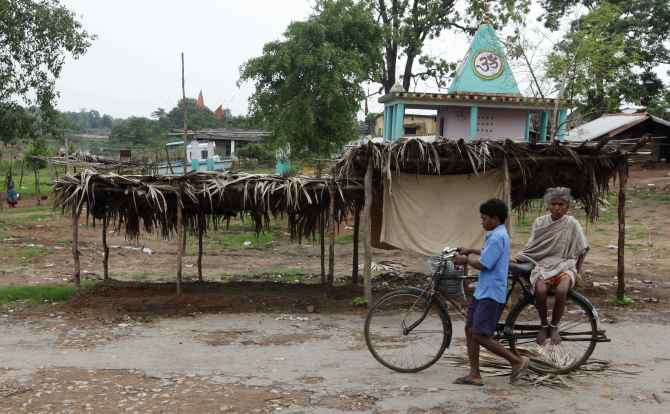
Jharkhand is home to nine political parties with some degree of influence over voters who are culturally inclined towards the adjoining states of Bihar, Chhattisgarh, West Bengal and Odisha.
Besides the two national parties -- the BJP and the Congress -- the Trinamool Congress of West Bengal, RJD and Janata Dal (U) of Bihar, and Bahujan Samaj Party of Uttar Pradesh have made inroads into the state.
"The number of parties is the main reason behind political instability in Jharkhand," says Deepak Prakash, the BJP's state vice-president.
Chatra, which covers one of India's worst-affected Maoist districts, Latehar, and Palamu constituencies are decided on caste factors because of their proximity to Bihar.
In Chatra, Brahmin and Rajput voters are about equal in number, but they vote against each other. "So, an independent candidate, Inder Singh Namdhari, a Sikh, won because of his clean image. Both communities voted for him," explains R K Kishor, senior state Congress leader and former legislator from the region.
Though voters from each constituency have special expectations from their candidates, they are joined in demands for roads, hospitals and jobs.
Ghuran Ram of the Jharkhand Vikas Morcha (Prajatnatrik) says he is promising overall development for Palamu.
“Corruption has become the identity of Jharkhand. My priority is to provide basic amenities and to prevent people from migrating to other cities," he adds. He is contesting against the BJP's V D Ram, former director-general of Jharkhand police.